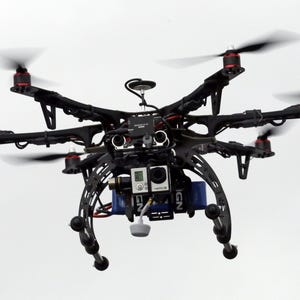The Oregon Legislature is examining whether to remove legal language that allows weaponization of unmanned aircraft systems, commonly referred to as drones.
Legislation passed in 2013 prevented public bodies — including police departments, but not private citizens — from operating armed drones.
House Bill 4066, sponsored by Rep. John Huffman, R-The Dalles, would make it a Class A misdemeanor to operate a drone that can fire a bullet or is otherwise a dangerous weapon. The bill would make it a Class A violation if a drone operator shines a laser from a drone, crashes into another aircraft or prevents an aircraft from landing.
HB 4066 would also require public agencies collecting data like video or audio via drones to have a public policy about how that data is used and stored.
Proponents of the bill and Huffman have called HB 4066 a common sense approach to drone regulation. However, enforcement may pose a challenge. For example, if a law enforcement officer were to spot an armed drone, ticketing its operator could prove difficult.
“You pretty much have to catch the thing if you want to know who it belongs to,” said Chuck Allen, director of SOAR Oregon, a group “focused on the development of the Unmanned Aircraft Systems (UAS) industry in Oregon.”
The Federal Aviation Administration requires drone operators to register aircraft and put a unique ID number on the drone’s body. More than 325,000 drones have been registered, greater than the number of piloted aircraft in the United States. But because some drones are small — registration requirements kick in at just over a half-pound — it is nearly impossible to read the ID number while a drone is in flight, potentially hundreds of feet off the ground.
The ID numbers are primarily for finding the drone operator if the aircraft crashes, said Allen, who is also a member of Huffman’s Work Group on Unmanned Aircraft Systems. The permanent work group is made up of law enforcement personnel, advocates, hobbyists and legal experts and helps to form policy ideas.
On Tuesday, Huffman said technology may be developed to identify drone operators in other ways.
“I think the jury’s still out,” he said. “I don’t think the FAA has an answer to that yet.”
Huffman has been the Legislature’s most active lawmaker on drone issues. He said he became interested in how drones relate to privacy in 2012 after hearing complaints about drones flying over private residences.
“I thought, you know that’s an issue I might like to pick up,” Huffman said.
In 2013, the Legislature passed HB 2710, sponsored by Huffman, which prevents law enforcement from using drones without a warrant, with exceptions for exigent circumstances.
Since then, Huffman has been invited to testify on drones in Washington, which he declined to do, saying he isn’t looking for attention. His central message is that people should educate themselves on drone rules.
“Know before you fly,” he said.
HB 4066 will likely be scheduled for a work session before the House Judiciary Committee at 3 p.m. on Wednesday, Feb. 10. at the Capitol.
